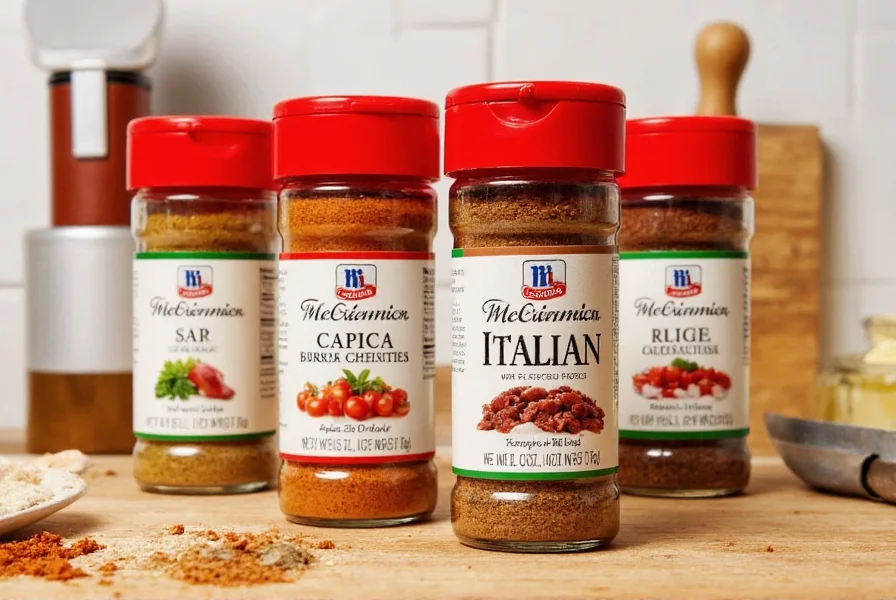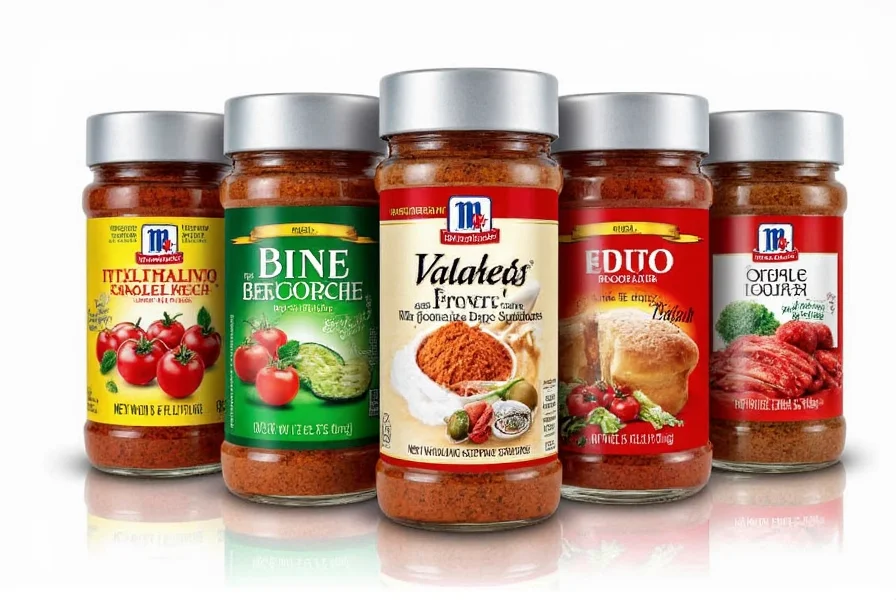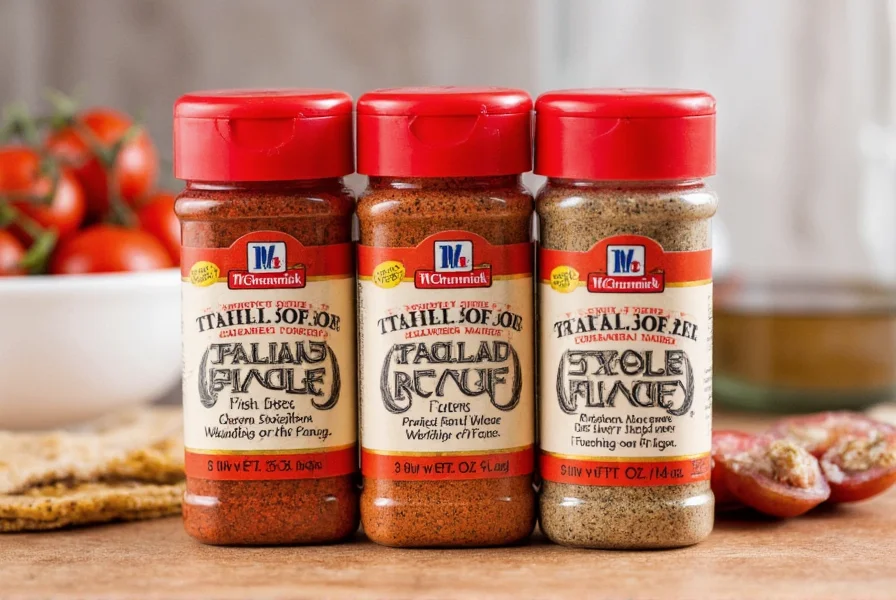Quick Answers: McCormick Italian Spices
- What's in McCormick Italian Spices? Basil, oregano, rosemary, thyme, and marjoram
- How to use it? In pasta sauces, grilled vegetables, meat rubs, breadsticks, and salad dressings
- How long does it last? 2-3 years when stored properly in a cool, dark place
- Is it gluten-free? Yes, McCormick offers a certified gluten-free version
- Can I use it in non-Italian dishes? Absolutely! Works well in Mediterranean, American, and Asian-inspired dishes
Why McCormick Italian Spices Are a Kitchen Staple
If there's one spice blend that belongs in every pantry, it's McCormick Italian Spices. Whether you're whipping up a quick marinara or seasoning chicken for dinner, this iconic mix brings the vibrant flavors of Italy straight to your kitchen.
Made with a perfect balance of herbs like basil, oregano, rosemary, thyme, and marjoram, McCormick's blend offers an earthy, aromatic flavor that complements both classic and modern dishes. It's the ultimate shortcut to authentic Italian taste without having to measure out individual spices.
Flavor Profiles: What's in That Blend?
Understanding what goes into McCormick Italian Spices is key to using them effectively. Let's break down the ingredients:
- Basil: Bright, peppery, and slightly sweet—great for fresh tomato sauces.
- Oregano: Earthy and bold, it adds depth to meat dishes and pizza.
- Rosemary: Woody and aromatic, ideal for roasted vegetables and meats.
- Thyme: Subtle lemon notes that work well in soups and stews.
- Marjoram: Similar to oregano but milder, often used in delicate pasta sauces.

This balanced combination gives McCormick its signature versatility—it can stand alone or enhance other seasonings in your recipe arsenal.
5 Versatile Uses for McCormick Italian Spices
You might think Italian spices are only for pasta and pizza, but their uses extend far beyond! Here are five clever ways to incorporate McCormick Italian Spices into your meals:
- Pasta Sauces: Sprinkle into marinara, alfredo, or arrabbiata sauce for a burst of flavor.
- Grilled Vegetables: Toss zucchini, bell peppers, and eggplant with olive oil and a pinch of the blend before roasting.
- Meat Rubs: Mix with garlic powder and olive oil to create a savory rub for chicken or pork chops.
- Homemade Breadsticks: Brush olive oil on dough, sprinkle generously, and bake until golden.
- Italian Salad Dressing: Whisk with olive oil, red wine vinegar, Dijon mustard, and a bit of honey for a flavorful dressing.
Pro Cooking Tips: From Pasta to Pizza
Ready to take your Italian cooking to the next level? Here are some expert-approved tips to make the most of McCormick Italian Spices:
- Layer Flavors: Add the spice blend at different stages—start with sautéed onions and garlic, then stir in part of the spices early, and the rest near the end for a fresher aroma.
- Dry Brining Meats: For juicy grilled chicken, let it sit overnight with a sprinkle of Italian spices and salt.
- Use in Baking: When making focaccia or flatbreads, mix the spice directly into the dough or sprinkle on top before baking.
- Add Fresh Herbs Later: If using fresh basil or parsley, add them at the end to preserve their color and brightness.
McCormick vs. Other Italian Spice Blends: A Comparison
While McCormick is a household name, there are several other brands offering Italian spice blends. Here's how they stack up:
| Brand | Main Ingredients | Flavor Intensity | Best For |
|---|---|---|---|
| McCormick Italian Seasoning | Basil, Oregano, Rosemary, Thyme, Marjoram | Moderate | Classic Italian dishes, sauces, and marinades |
| Simply Organic Italian Herb Blend | Organic Basil, Oregano, Sage, Thyme | Mild | Health-conscious cooks looking for clean labels |
| Badia Italian Seasoning | Oregano, Basil, Garlic, Parsley | Strong | Heartier dishes like stews or grilled meats |
| Penzeys Italian Seasoning | Oregano, Thyme, Rosemary, Marjoram, Savory | Vibrant & Balanced | Artisanal home cooks seeking gourmet flavor |
Buying Guide: How to Choose the Best McCormick Italian Spices
With so many variations available, here's how to choose the right McCormick Italian Spices product for your needs:
Types of McCormick Italian Spice Products
- McCormick Gourmet Italian Seasoning
- Features a premium blend with larger herb pieces for visual appeal.
- Ideal for garnishing finished dishes or sprinkling over focaccia.
- Great for food photographers and chefs who care about presentation.
- McCormick Original Italian Seasoning
- The classic go-to blend found in most supermarkets.
- Perfect for everyday cooking, from sauces to casseroles.
- Affordable and widely available.
- McCormick Gluten Free Italian Seasoning
- Certified gluten-free option for dietary-sensitive individuals.
- Same great taste without any additives that contain gluten.
- Safe for those following a gluten-free lifestyle or managing celiac disease.
Factors to Consider When Buying
- Packaging Size: Available in shakers, small jars, and bulk bags. Choose based on how often you cook Italian-style dishes.
- Expiration Date: Always check freshness. Ground spices lose potency over time, so opt for smaller quantities if you don't use it frequently.
- Form (Shaker vs. Jar): Shakers offer convenience; jars allow for more precise measuring and better storage.
- Intended Use: Decide whether you want a general-purpose blend or something tailored for specific dishes like pizza or roasted meats.
Creative Ways to Use Italian Spices Beyond the Obvious
Think outside the spaghetti pot! Here are some unexpected yet delicious ways to enjoy McCormick Italian Spices:
- Potato Wedges: Toss with olive oil and McCormick before baking for herby fries.
- Egg Dishes: Sprinkle on scrambled eggs or frittatas for a Mediterranean twist.
- Popcorn: After popping, drizzle lightly with melted butter and shake in some spice blend.
- Hummus Boost: Stir into homemade hummus for an herby kick.
- Cheese Board Accent: Lightly dust soft cheeses like burrata or mozzarella with the spice for added depth.
Frequently Asked Questions About McCormick Italian Spices
Got questions about using McCormick Italian Spices? We've got answers to the most common queries from home cooks like you.
What's the difference between Italian seasoning and Italian dressing mix?
Italian seasoning is a blend of dried herbs (typically basil, oregano, rosemary, thyme, and marjoram) without added oil or vinegar. Italian dressing mix usually contains those same herbs plus salt, sugar, and other seasonings designed to be mixed with oil and vinegar to make a salad dressing.
How long does McCormick Italian Spices last?
When stored properly in a cool, dark place, McCormick Italian Spices will maintain their best flavor for 2-3 years. While they won't spoil, the flavor will gradually diminish over time. You'll know it's time to replace your blend when the aroma becomes weak and the color fades from vibrant green to a dull brown.
Can I substitute fresh herbs for the McCormick Italian Spices blend?
Absolutely! As a general rule, use three times the amount of fresh herbs as you would dried. So if a recipe calls for 1 teaspoon of the McCormick blend, use about 3 teaspoons of finely chopped fresh herbs. Keep in mind that fresh herbs are best added toward the end of cooking to preserve their delicate flavor.
Is McCormick Italian Seasoning gluten-free?
Yes, McCormick offers a gluten-free version of their Italian Seasoning that's certified gluten-free. The standard version is also naturally gluten-free as it contains only herbs and spices with no wheat-based ingredients, but if you have celiac disease or severe gluten sensitivity, the certified gluten-free version is recommended for safety.
How does McCormick Italian Seasoning compare to making my own blend?
McCormick provides consistent flavor and convenience—no measuring individual spices. Homemade blends let you customize proportions to your taste. McCormick's professional blending ensures optimal herb ratios that work across many dishes, while homemade versions might vary in quality depending on the freshness of your individual herbs.
Can I use Italian seasoning in non-Italian dishes?
Definitely! Italian seasoning works wonderfully in Mediterranean, American, and even some Asian-inspired dishes. Try it in roasted potatoes, sprinkled on avocado toast, mixed into yogurt dips, or added to meatloaf for extra depth of flavor. Its herbal profile complements many cuisines beyond traditional Italian cooking.
Final Thoughts: Is McCormick Italian Spices Worth It?
In short—yes! McCormick Italian Spices delivers consistent flavor, convenience, and versatility. Whether you're a seasoned chef or a weekend pasta lover, keeping a bottle in your spice rack will elevate your meals effortlessly.

So the next time you're wondering how to boost flavor without adding complexity, just reach for that familiar yellow bottle. Your taste buds—and maybe even your guests—might just ask, "What's your secret ingredient?"











 浙公网安备
33010002000092号
浙公网安备
33010002000092号 浙B2-20120091-4
浙B2-20120091-4